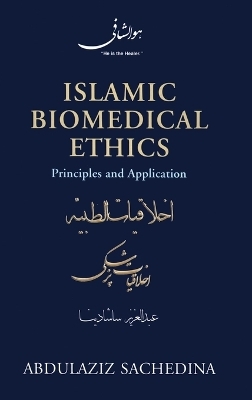
Islamic Biomedical Ethics Principles and Application
Seiten
2009
Oxford University Press Inc (Verlag)
978-0-19-537850-4 (ISBN)
Oxford University Press Inc (Verlag)
978-0-19-537850-4 (ISBN)
In this pioneering work, Abdulaziz Sachedina - a scholar with life-long academic training in Islamic law - relates classic Muslim religious values to the new ethical challenges that arise from medical research and practice.
In this pioneering work, Abdulaziz Sachedina relates classic Muslim religious values to the new ethical challenges that arise from medical research and practice. He depends on Muslim legal theory, but moves beyond juridical practice to search for the underlying reasons that determine the rightness or wrongness of a particular action. Drawing on the work of diverse Muslim theologians he outlines a form of moral reasoning that can derive decisions that underscore the spirit of the Shari'a and yet leave room to revisit earlier decisions and formulate new ones that in turn need not be understood as absolute or final. After laying out this methodology, he applies it to a series of ethical questions surrounding the human life cycle from birth to death, including such issues as abortion, euthanasia, and organ donation. Sachedina's work is unique in that it aims at conversing with Jewish and Christian ethics, moving beyond the Islamic fatwa literature to search for a common language of moral justification and legitimization among the followers of Abrahamic traditions.
In this pioneering work, Abdulaziz Sachedina relates classic Muslim religious values to the new ethical challenges that arise from medical research and practice. He depends on Muslim legal theory, but moves beyond juridical practice to search for the underlying reasons that determine the rightness or wrongness of a particular action. Drawing on the work of diverse Muslim theologians he outlines a form of moral reasoning that can derive decisions that underscore the spirit of the Shari'a and yet leave room to revisit earlier decisions and formulate new ones that in turn need not be understood as absolute or final. After laying out this methodology, he applies it to a series of ethical questions surrounding the human life cycle from birth to death, including such issues as abortion, euthanasia, and organ donation. Sachedina's work is unique in that it aims at conversing with Jewish and Christian ethics, moving beyond the Islamic fatwa literature to search for a common language of moral justification and legitimization among the followers of Abrahamic traditions.
Abdulaziz Sachedina is a Professor of Religious Studies at the University of Virginia
GLOSSARY; END NOTES; SELECT BIBLIOGRAPHY
| Erscheint lt. Verlag | 28.5.2009 |
|---|---|
| Verlagsort | New York |
| Sprache | englisch |
| Maße | 234 x 160 mm |
| Gewicht | 550 g |
| Themenwelt | Geisteswissenschaften ► Religion / Theologie ► Islam |
| Studium ► Querschnittsbereiche ► Geschichte / Ethik der Medizin | |
| Sozialwissenschaften ► Soziologie | |
| ISBN-10 | 0-19-537850-4 / 0195378504 |
| ISBN-13 | 978-0-19-537850-4 / 9780195378504 |
| Zustand | Neuware |
| Haben Sie eine Frage zum Produkt? |
Mehr entdecken
aus dem Bereich
aus dem Bereich
Die Geschichte eines Weltzentrums der Medizin von 1710 bis zur …
Buch | Softcover (2021)
Lehmanns Media (Verlag)
17,95 €
Krankheitslehren, Irrwege, Behandlungsformen
Buch | Softcover (2024)
C.H.Beck (Verlag)
39,95 €


